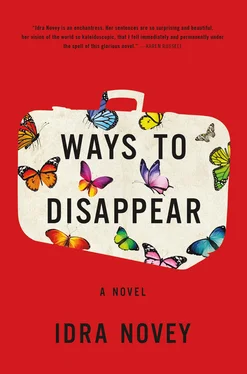She wanted him here now, slurping a beer beside her, spewing vulgar jokes about her mother’s poker skills, jokes that were so outrageous that she would be laughing despite herself. Even Thiago would have known to lay off when the amount of money lost passed half a million and her mother hadn’t stopped. In a panic, or goaded by Flamenguinho to recover his investment, her mother had gone on playing as if gambling online were no more than a tale she had invented, as if she were still a child and didn’t know the difference, still the daughter who made up ghost stories for her father while he resoled the boots of strangers.
The thought filled Raquel with resentment and longing. It was like sitting in the hot car again, waiting for her mother to return. Once, the wait had been treacherously long. The temperature in the car had gone on rising until she felt dizzy, the hot seat painful against her skin. Her eyes kept getting drier, her thoughts blurring in her head. When her mother finally rushed up to the car, sweaty and upset and apologetic, Raquel assumed she’d gotten lost. Her mother didn’t explain, and Raquel had been too afraid to ask.

Marcus jumped up from the table. That was her, he said. That was my mother. I’m sure of it.
The rain was shattering down outside the restaurant as if someone had smashed a glass pitcher. Marcus ran into it anyway, and Emma felt obliged to follow. The first two times he’d been convinced he’d seen his mother on the island, both women had turned out to be tourists from Germany. Now, around the corner, Marcus and Emma startled a small freckled woman from Australia.
I’m sorry, Marcus said as they returned to their table, water dripping down their foreheads into their eyes.
It’s okay. It’s hard to see in this rain. Emma mopped her face with one of the napkins from the dispenser on the table, but it was futile. Like the napkins in all cheap Brazilian restaurants, they were plastic-based and made her feel like she was wiping her face with a garbage bag. She had lost her stamina for startling foreigners in the rain. If Beatriz was on this island, it was going to be on the other side, where the ruins of the prison were, and where none of the boatmen would take them until the storm passed.
I’m getting cold, she told Marcus. Don’t you want to put on some dry clothes?
I don’t mind. You go ahead. I’ll keep looking.
She nodded, swatting at the mosquitoes feasting on her ankles. She hoped she’d get a respite from them in her room, but the mosquitoes were there as well, sneaking in through the holes in the window screens and between the planks of the floor. The only place to avoid them was under the grimy netting draped over the bed. Trapped beneath it, scratching at her bites, Emma opened the various books she’d brought to read but was too itchy to get into any of them.
She pulled out her notebook. The courtroom scene that had come to her in Beatriz’s bathroom had continued to return. Each time, her mind took her a little further into the scene and the images wouldn’t let go of her until she’d written them down. She didn’t know if she was embarrassing herself by taking the scene seriously enough to record it, but what did she have to lose? She was so good and humiliated already, having insisted on this trip to Ilha Grande with such confidence that she’d led her author’s son to believe finding his mother might just be a matter of running enough times into the rain.
Hunched under the mosquito netting, Emma uncapped her pen. In the courtroom ceiling above her translator’s hazy head there surely would be a hole. For two thousand years, when it rained anywhere in the world, it had rained over the translator. When it snowed, surely the jury would accuse the translator of hiding behind the snow.
Emma was just about to begin another page when she heard the slap of flip-flops outside her room. You left your sneakers out here, Marcus called through the door.
I know. They were too wet to bring inside.
Well, there are ponds in them now. And some tadpoles swimming around. I could hang them up for you.
Emma opened the door and Marcus raised her sneakers, so waterlogged they hung from his hand like slippers.
I hung mine from the ledge above the toilet, he said, and she moved aside so he could carry her sneakers past her with his liquid ease. Above the commode, he lodged the shoes at a tilt, knotting their soggy laces to the curtain. See? This way they won’t fall in the bowl, he said, and, turning around, gestured toward her bed, and she stepped away. He was going to ask her if she wanted to have sex. He was going to offer up the idea as casually as suggesting a game of Boggle.
But he only pointed to her open notebook on the bed. So you write, too, he said.
Oh, no, I don’t write. She backed up. I was just, you know, taking notes.
To: eneufeld@pitt.edu
Subject: alive?
Emma, please answer already. I’m sorry I went off like that in the car but you didn’t even tell me before you bought your ticket. I can’t stop checking my email and the cats keep meowing for you at the bathroom door. They think you’re hiding in there, reading.

More notes?
Marcus came up behind her on the balcony the next morning in a pair of orange swim trunks, the waistband so low that she could see where the muscles sloped toward his groin.
Oh, yes, just more boring translator notes. Emma flipped the journal shut. Knocked out of the trees by the wind overnight, dozens of jackfruit now lay splattered on the ground, their insides sugaring the air. Emma wasn’t sure if it was their scent or the wet mangy dog on the balcony that was making her sneeze.
I don’t know how many more days I can wait out this rain, she said, and blew her nose again.
We should probably go anyway. He handed her the gossip section from yesterday’s edition of O Globo. Emma immediately recognized the ferry in the photo and the sylphlike sprawl of legs and arms of the man beside her. But what was that look on her face?
Somebody who didn’t know better would say it was desire — what a man will deny himself until he can’t. Beatriz had written the line at the close of her story “Santiago Martins.”
In Portuguese, Beatriz had technically written, what a man will deny himself until he won’t.
Emma had thought “can’t” made more sense than “won’t” for capturing the boldness and Brazilian spirit of the sentence. As she shivered at her desk in Pittsburgh, the winter creaking in through the windows while Miles snored in the next room, it felt indisputable. Santiago’s desire had to be imperative, to carry the weight of fact.
At least in English.

Roberto Rocha stared at the can of olives on his desk. It was the second offering of condiments he’d received from the supermarket across the street. Yet another of his ingratiating novelists had shown up to pitch a manuscript that the young man had read through only once himself. Rocha told him that if he spent as much time revising as he did fantasizing about his books being made into movies, maybe the press would’ve come close to breaking even at some point in the last seven years.
Such conversations were deadening his senses. He didn’t want an offering of canned olives. He wanted someone to show up with a manuscript so unprecedented it made the temperature in his body rise. An author whose sentences were so sublime they made his head ache, who could deliver an image so precise and true he responded with every atom in his body. To keep publishing books that meant nothing to him was turning him into a fraud. A braver man would’ve given up by now and let the press fold.
Читать дальше













